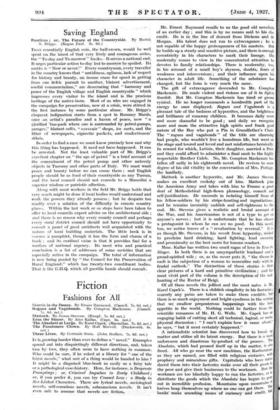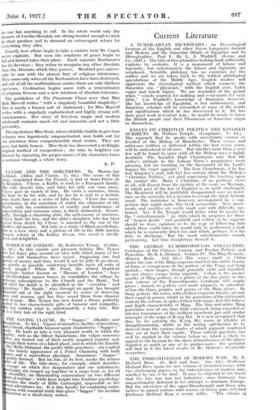Fiction -
Fashions for All
Mattock. By James Stevens. (Knopf. 7s. 6d. net.) Eros the Slayer. By Aino Kailas. (Cape. 6e. net) IT is growing harder than ever to define a " novel." Examples spread out into disquietingly different directions, and, taken two by two, they often seem to have nothing in common. Who could be sure, if he asked at a library for " one of the latest novels," what sort of a thing would be handed to him ? It might be a disguised blue-book as easily as a fairy 'tale or a pathological case-history. Here, for instance, is Desperate Promptings ; or, Criminal Impulses in Early Childhood ; or, if you -prefer it, you can try Crossed Love : a Study in Sex-Linked Characters. There are lyrical novels,. sociological novels, self-conscious -novels, subconscious novels. It isn't even safe to assume that novels are fiction.
-Mr. Ernest Raymond recalls to us the good old novelists of an earlier day ; and this is by no means said to his dia. credit. He is in the line of descent from Dickens and de Morgan. His talent does not run to extravagance ; he is not capable of the-happy grotesqueness of his masters. But
he builds up a steady and sensitive picture, and there is enough eccentricity in his characters to mark their lineage. His
modernity comes to view in the concentrated attention he devotes to family relationships. There is modernity, too, in his account of a small boy's shyness, doubts, fears of weakness and introversions ; and their influence upon his character in adult life. Something of the substance has changed, but the form is very much the same.
The gift of extravagance descended to Mr. Compton Mackenzie. He made violent and riotous use of it in Sylvia Searlett. But Mr. Compton Mackenzie has tired or grown
cynical. He no longer commands a hundredth. part of the energy he once displayed. Rogues and Vagabonds is a
pleasant tale of the badness of hypocrites, and the brightness and brilliance of runaway children. It becomes daily more and more shameful to be good ; and daily we recognize more and more the attractive high spirits and frank good nature of the Boy who put a Pin in Grandfather's Chair. The " rogues and vagabonds " of the title are charming bad people, who wouldn't live a humdrum life, but went on the stage and toured and loved and met misfortunes heroically. In reward for which, Letizia, their daughter, married a Peer, and they could afford to administer a final snub to the highly respectable Brother Caleb. . No, Mr. Compton Mackenzie has fallen off sadly in his eighteenth novel. He revives to some degree of his old vitality in the conversation of Mrs. Pottage, the landlady.
Mattock is another hypocrite, and Mr. James Stevens makes an excellent cockshy out of him. Mattock joins the American Army and takes with him to France a great
deal of Methodistieal high-flown phraseology, conceit and self-justification. He succeeds in isolating himself from all
his fellow-soldiers by his stripe hunting and ingratiations; and he remains incurably caddish and self-righteous to the end. Mr. Stevens gives a realistic and brutal account of the War, and his Americanism is not of a type to get on anyone's nerves ; but it is unfortunate that he has chosen a protagonist in whom he can see no good. In this novel,
too, we notice traces of a " revaluation by reversal." It is As. though Mr. Stevens, in his revolt from hypocrisy, wished to proclaim hard drinking, hard fighting, loud swearing and promiscuity as the best norm ler human conduct.
Mme. Kailas has written two small sagas of love in Eros The Slayer. In both there is an unsympathetic husband and a
proud-spirited wife ; or, as the cover puts it, " the theme in each is the subjection of a woman to masculine rule with its feudal outlook." The distinction of these stories is their
clear pictures of a hard and primitive civilization ; and the most vivid part of the volume is the deiscription of the seal. _hunting of the Rector of Reigi.
Of all these novels the jolliest, and the most naive is Ids Karel Cape-k's. There is a childish simplicity in his fantasias; scarcely any pains are taken to make them credible, but there is so much enjoyment and bright-eyedness in the writing that we swallow preposterous happenings with the best appetite in the world. Nothing could be further from the scientific romances of Mr. H. G. Wells. Mr. Capek has as engaging habit of cutting short all technical, logical, or meta- physical discussion : " I can't explain-how it came about,' he says, " but it most certainly happened."
A rationalistic scientist has discovered how to break UP matter and utilise all its latent energy. But there is a most unforeseen and digastrous by-product of the process. The Absolute, which had penned itself up' in the matter, is also freed. All who go near -the new machines, the Karburators, as they are named, are filled with religious ecstasies, with prophecy and miraculous gifts. _Capitalists who have intro- duced them into their factories-snake over all their goods t° the poor and give their businesses to the workmen. But the workmen are too blissfully happy to- rim-the factories, or t° distribute the goods which the Absolute, has begun to pow; out in incredible profusion. Mountains upon mountains...! knives -heap themselves up where no one can get them. n bank' make unending issues of currency and credit, 0" no one has anything to sell. In the whole world only the farmers of Czecho-Slovakia are strong-headed enough to stick to their produce and to demand an extravagant return for everything they offer.
Exactly how affairs begin to take a sinister turn Mr. Capek never explains: But soon the .emotions of peace begin to fail and hatred takes their place. Each separate Karburator has its devotees ; they refuse to recognize any other Absolute than the Absolute which they possess. Mankind goes univer- sally to war with the utmost fury of religious intolerance. They cease only when all the Karburators have been destroyed, and out of all the multitudinous armies there are only thirteen survivors. Civilization begins anew with a remembrance of religious fervour and a new intuition of absolute tolerance.
The publishers of The Passionate Clown aver that Miss Holt Marvell writes " with a singularly beautiful simplicity." This is surely a brawn sort of statement ; for Miss Marvell writes with a singularly sophisticated and highly strung self- consciousness. Her story of frivolous magic and modern witchcraft contains much wit and innuendo and not a little
perversity.
The mysterious Miss Stein, whose childlike babble in previous volumes was ingeniously mispunctuated, now holds out for our attention three comprehensible short stories. They are poor, but fairly honest. Miss Stein has discovered a strikingly original method of composition ; she tries to heighten our interest by repeating the proper names of the characters twice a sentence through a whole story.
A. P.







































 Previous page
Previous page